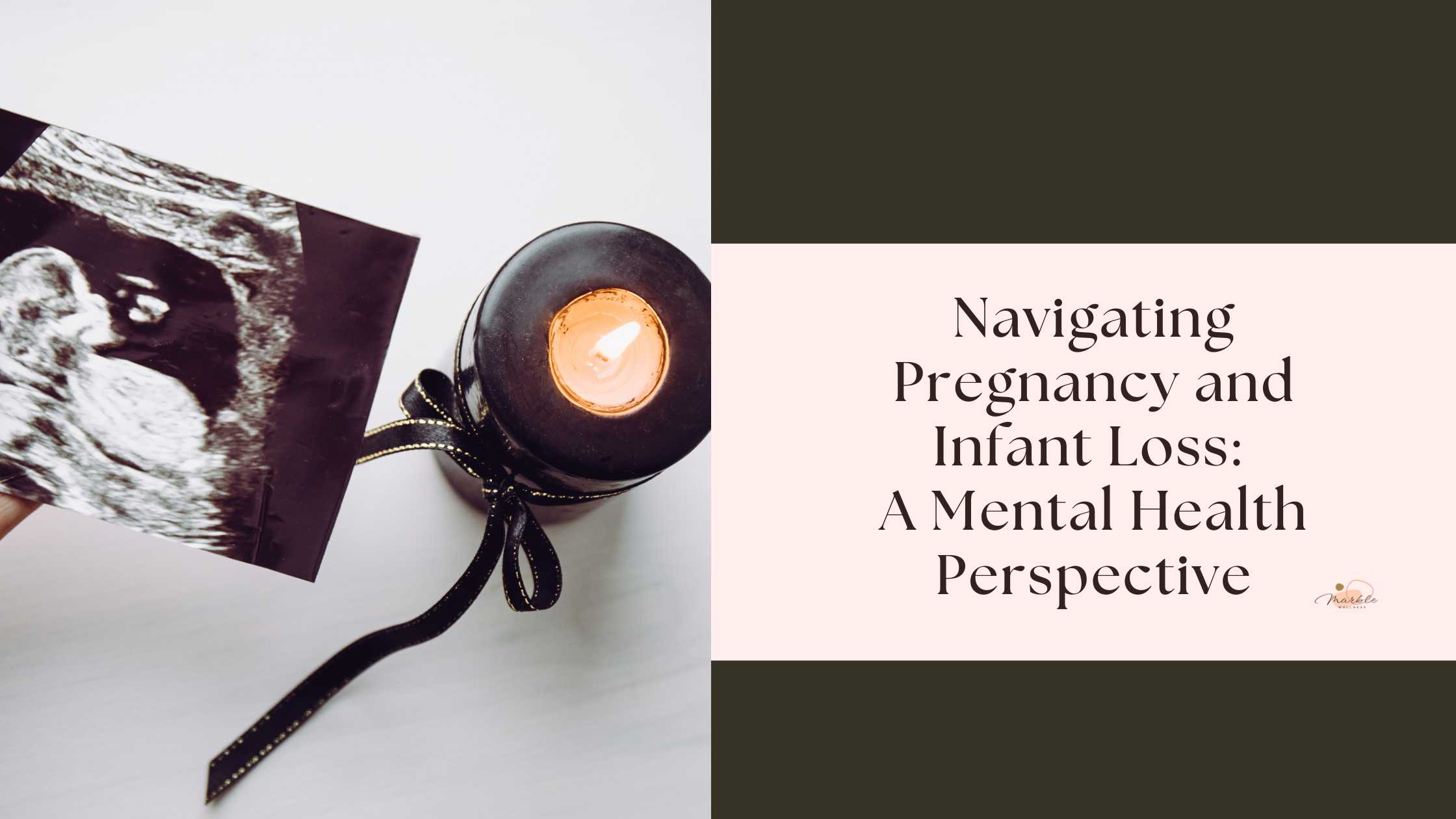October brings awareness to many important causes, but one that often remains in the shadows is Pregnancy and Infant Loss Awareness. For those who have experienced this type of loss, this month can be a bittersweet mix of emotions—both a sense of connection with others who understand, and a resurfacing of grief and pain. As a mental health therapist, I want to speak to the weight of this topic and offer support, not just for those who have lost a pregnancy or infant, but also for couples who are Trying to Conceive (TTC), a journey filled with both hope and heartache.
Pregnancy and Infant Loss Awareness Month
October is set aside to honor the lives lost to miscarriage, stillbirth, SIDS (Sudden Infant Death Syndrome), and other causes of infant death. It’s a time to bring visibility to a topic that is often kept private, and to offer space for grieving parents to share their stories, find solace, and build community. This month isn’t just about raising awareness for others, it’s about acknowledging the emotional toll these losses take on parents and their families.
Pregnancy loss can feel isolating. Many parents suffer in silence, as society doesn’t always make space for grief over a loss that may have occurred early in pregnancy or over a child who lived only a short time. But whether a loss happens in the early weeks or months later, the emotional impact can be profound. October is a time for parents to say, “I remember,” and for others to say, “I support you.”
For anyone seeking resources or community, organizations like SHARE Pregnancy and Infant Loss Support provide compassionate support and connection to families across the nation. The National SHARE website offers invaluable resources for grieving parents, including online forums, memorial events, and educational materials. Locally, in the St. Louis area and surrounding regions, SHARE also has dedicated support groups and chapters, giving families an opportunity to connect with others who have experienced similar losses. These local groups are an excellent place to find both community and professional support during such a difficult time.
The Emotional Journey of TTC (Trying to Conceive)
For many couples, Trying to Conceive (TTC) is filled with a complex range of emotions. The anticipation of pregnancy is often full of excitement, but what’s less spoken about is the anxiety, fear, and even dread that can accompany the process. It’s easy to focus on the hope—those two pink lines on a test, the dreams of a growing family—but the reality is that TTC also comes with waiting, disappointment, and uncertainty.
TTC is more than just trying to get pregnant. It can mean undergoing fertility treatments, tracking ovulation cycles, or timing everything down to the minute. It also means navigating the heartbreak of negative pregnancy tests or, for some, the devastating loss of a pregnancy. For couples who have experienced miscarriage or infant loss, the TTC process can carry extra weight—each new attempt to conceive feels like stepping into the unknown again, hoping this time will be different.
For many, the anxiety doesn’t end with a positive pregnancy test. The fear of miscarriage or loss can loom large, especially for those who have experienced it before. Every ultrasound, every doctor’s appointment can feel like a hurdle. The dream of a healthy pregnancy becomes intertwined with the fear of losing it. It can feel impossible to lean into the joy of being pregnant, which can cause anger and resentment toward the whole process.
Coping with the Anxiety and Heartache of Pregnancy & Infant Loss
Navigating the emotional complexities of TTC and loss can be incredibly difficult, especially when surrounded by friends, family, and social media images of seemingly perfect pregnancies and happy endings. It’s important to acknowledge that this journey is personal, and the feelings that come with it are valid. Here are a few ways couples can navigate these hardships:
Open Communication: One of the best ways to support each other is through honest and open communication. It’s easy for one partner to withdraw or feel like they’re handling the emotional toll differently, but staying connected by sharing fears, hopes, and disappointments can help maintain a sense of unity. It’s okay to admit when you’re scared or when you’re struggling.
Create Boundaries: Everyone grieves differently, and sometimes that means setting boundaries with people who may not fully understand what you’re going through. This might involve limiting time on social media, avoiding certain conversations, or asking loved ones to respect the space you need. It’s okay to protect your emotional well-being.
Lean on Each Other: The process of TTC can create a sense of isolation, especially when it feels like everyone else is moving forward with their families. Make time for each other, even outside of discussions about pregnancy or loss. Whether it’s date nights or just quiet time together, nurturing your relationship is essential during this challenging time.
Practice Self-Compassion: It’s easy to fall into the trap of blaming yourself or feeling like you’re not doing enough. But remember, infertility or loss is not a reflection of your worth. Be kind to yourself, and allow space for all the emotions that come with this journey.
Seek Support: Whether through a support group or individual counseling, connecting with others who understand can be invaluable. You are not alone in this journey, and finding a community of people who have been there can help ease the emotional burden. The local SHARE chapters in St. Louis and the surrounding areas are wonderful resources for anyone seeking peer support, professional guidance, or even a compassionate ear.
How Therapy Can Help Navigate Pregnancy and Infant Loss
As a mental health therapist, I often work with couples and individuals navigating TTC, miscarriage, and infant loss. Therapy offers a safe space to process the grief, anxiety, and trauma that can accompany these experiences. It’s not about finding “fixes” for the pain, but about learning how to move through it in a way that allows for healing.
- Grief Counseling: Losing a pregnancy or infant brings a profound sense of grief. Therapy provides a place to process this grief, give it the attention it needs, and explore ways to honor the loss. Having a dedicated space to talk about the emotional toll can make it feel less overwhelming.
- Managing Anxiety: The uncertainty of TTC and the fear of another loss can create intense anxiety. In therapy, we can work on managing those anxious thoughts through mindfulness techniques, cognitive-behavioral strategies, or just having a space to voice those fears. A therapist can help you navigate the tension between hope and fear, allowing both to exist without overwhelming you.
- Couples Counseling: TTC and pregnancy loss can strain a relationship. Couples counseling can help you reconnect with your partner, ensuring that both of you feel heard and supported. It’s about creating a shared narrative around what you’re going through, rather than feeling like you’re walking separate paths.
- Finding Hope: Therapy isn’t just about addressing pain—it’s also about finding hope and resilience in the face of hardship. While we may not be able to control the outcome of a pregnancy, we can work on how we handle the uncertainty. Therapy can help you find ways to build hope again, even in the most difficult circumstances.
Pregnancy and infant loss, as well as the journey of trying to conceive, are deeply emotional experiences. This October, as we acknowledge Pregnancy and Infant Loss Awareness Month, let’s create space for those still on their journey, navigating the hope, anxiety, and heartache that come with TTC. If you’re in the midst of this process, know that your feelings are valid, and there is support available—whether from loved ones, support groups, or a therapist who understands.
Start Counseling for TTC Couples in St. Louis and Beyond
No matter where you are in your journey, take time to care for your mental health, lean on your partner, and allow yourself to grieve, hope, and heal. You don’t have to navigate this alone. Reach out to local resources, like SHARE in the St. Louis area, or consider seeking therapy to guide you through the emotional ups and downs. A skilled and compassionate maternal mental health therapist can help. If you live in St. Louis and are ready to improve your mental health, we are here to help. However, if you’d prefer to work with a therapist online, we have online therapy in Missouri, online therapy in Illinois, and some online support groups starting soon!
Contact Us!
Learn About Our Group Offerings

Additional Counseling Services at Marble Wellness in St. Louis, MO and Chicago, IL
Counseling services are designed to help set you on a path of living a more fulfilled, calm, and happy life.
St. Louis
Our St. Louis team of therapists has a variety of training backgrounds and areas of expertise. We specialize in anxiety, depression, grief, chronic illness, therapy for men, couples, and maternal overwhelm. Our practice also helps new moms with various postpartum concerns, moms in the thick of parenting, and moms with teens. We can also chat from wherever you are in the state with online therapy in Missouri and online therapy in Illinois. No matter where you are in your journey, we would love to support you.
Chicago
Our Chicago team of therapists offers a wide range of mental health services to help our clients through the different challenges and hurdles in their lives. In addition to anxiety, depression, grief, therapy for men, and maternal overwhelm, we specialize in professional burnout, therapy for breakups, and love partnering with working moms.



